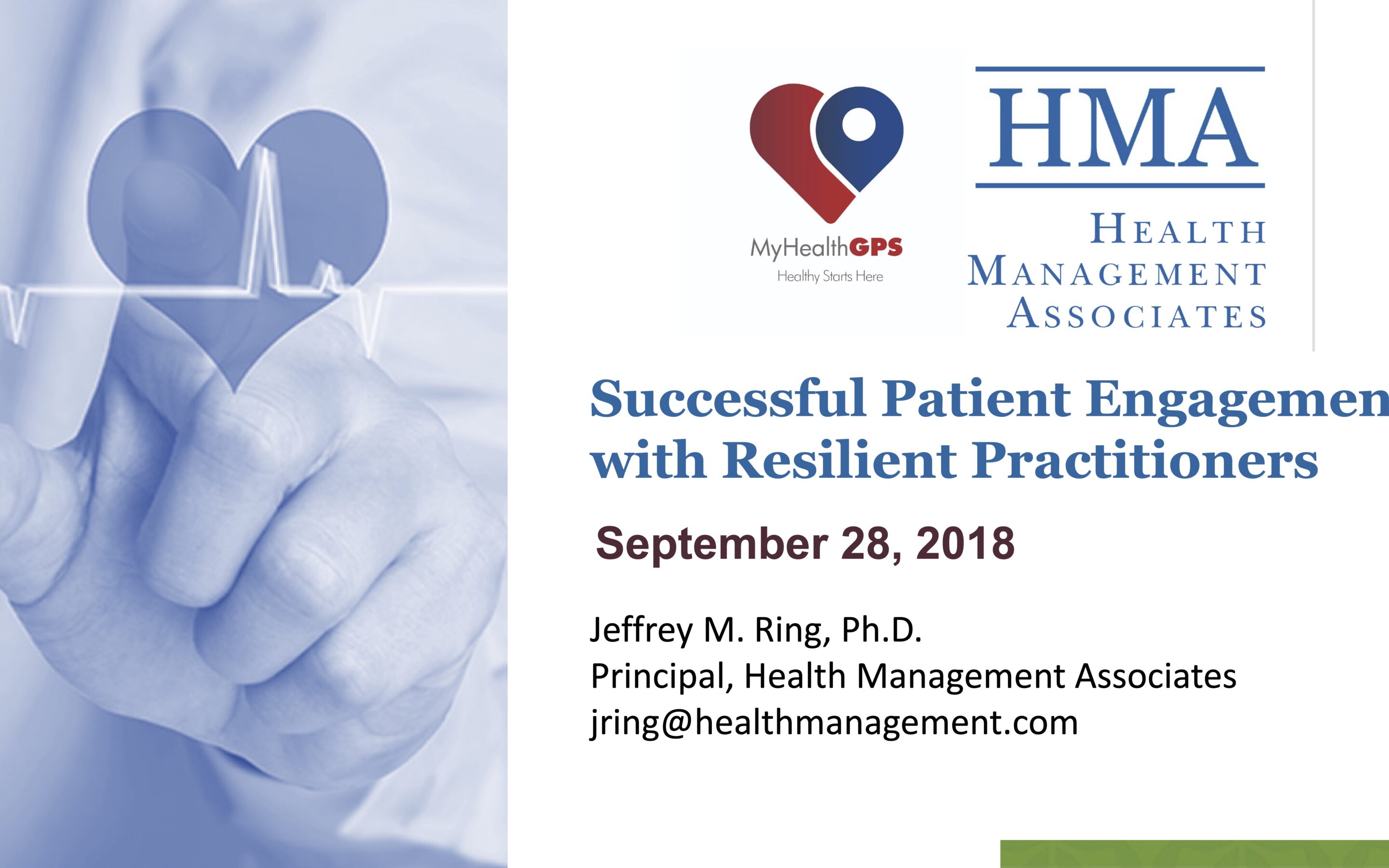Adapting Evidence Based Practices for Integrated Care
This webinar workshop series focuses on key elements of evidence-based practices/treatments to assist providers with achieving successful implementation and outcomes. HMA presenters discuss key components of EBPs including but not limited to training, indicated populations, fidelity assessments, tools, and other relevant topics. This webinar includes an interview with psychologist Jennifer Frey who discusses the ways in which she uses and adapts the EBP of Motivational Interviewing in her work as a behavioral health consultant at Unity. Following this webinar, there is a series of three EBP workshops that includes cognitive behavior therapy, behavioral interventions for stress management trauma-informed care, problem-solving therapy.Integrated Care DC Provider Information Session
Integrated whole-person care has been shown to improve outcomes and increase Medicaid beneficiary satisfaction. We want to support you to enhance your practice’s capability to deliver person-centered care, use population health analytics, and engage leadership to support value-based care. Join us to learn more about provider engagement opportunities for year 2 of the Integrated Care DC Program.TeleHealth Workflow Comparison
Telehealth in a Post-Pandemic Era: Sustainable Approaches to Support Integrated Care – Test

Viewing Time 1 Hour
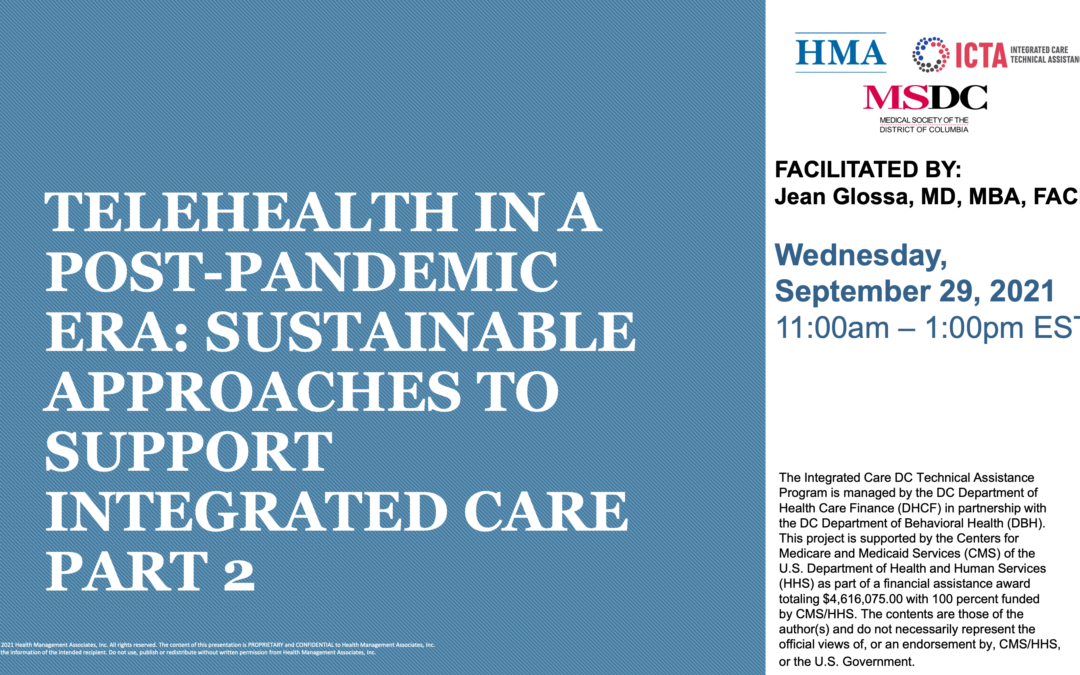
Telehealth in a Post-Pandemic Era Sustainable Approaches to Support Integrated Care – Part 2
This interactive virtual workshop is part two of a two-part series to support providers ongoing efforts to implement and sustain innovative models of telehealth following the COVID-19 public health emergency. Topics include best practices to support behavioral health care delivery through telehealth; improving patient engagement through telehealth and DC telehealth policy and priority updates.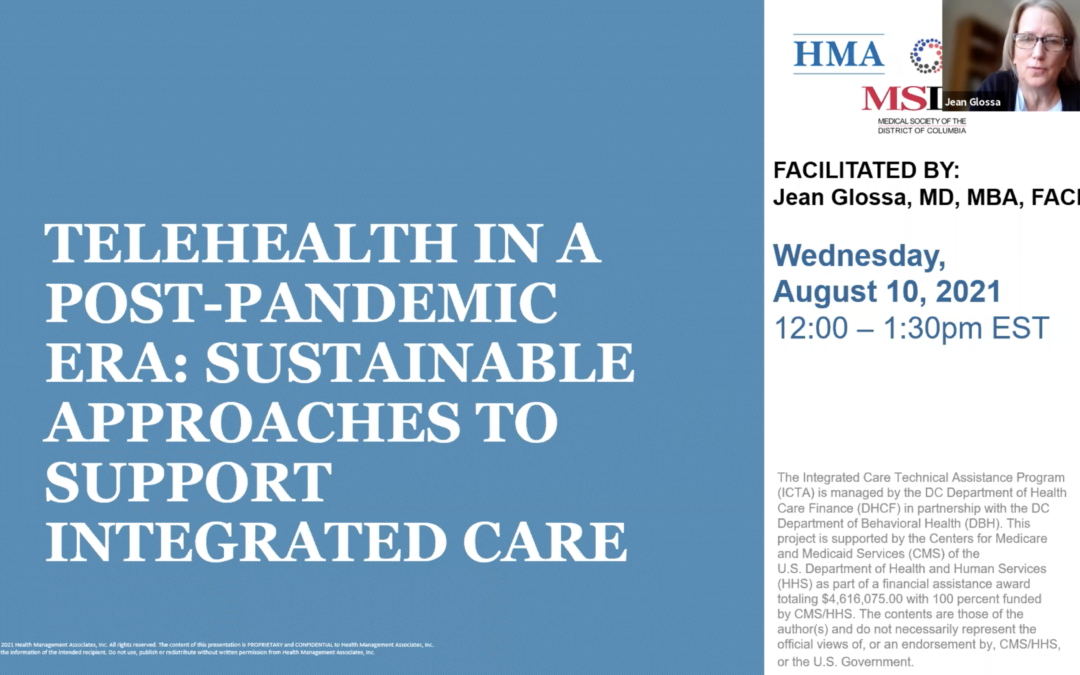
Telehealth in a Post-Pandemic Era: Sustainable Approaches to Support Integrated Care – Part 1
https://www.integratedcaredc.com/wp-content/uploads/2021/08/Webinar-Telehealth-in-a-Post-Pandemic-Era-Sustainable-Approaches-to-Support-Integrated-Care.mp4Webinar This interactive virtual workshop is part one of a two-part series to support providers ongoing efforts...Using Disease Registries to Improve Your Practice Population’s Health
This webinar focuses on effective strategies for engaging justice-involved populations and ways to support individuals transitioning to communities. The speakers shared case studies to illustrate the ways that providers have managed transitions of care and supported people. This session is approved by the American Academy of Family Physicians for up to 1 AMA Level 1 CME credit.Preliminary Data from the Drug Abuse Warning Network – April 2019-October 2020
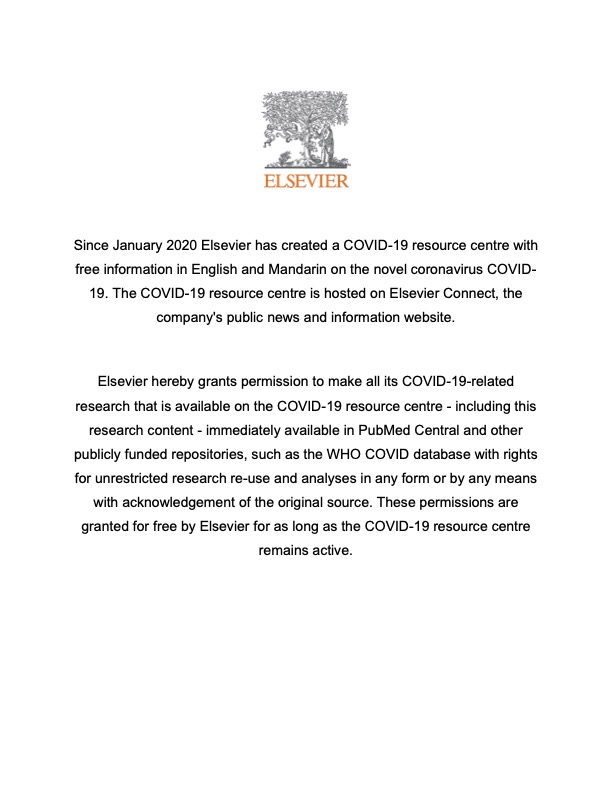
Implementing Telemedicine in Primary Care: Learning Lessons From Electronic Health Records
The common narrative is coronavirus disease 2019 happened, payment and policy barriers were quickly lowered, and voila, telemedicine, a technology for which adoption had been slow over the past decade, is, within a matter of months, in widespread and successful use. Fait accompli. On to this narrative has been grafted the hopes that telemedicine will solve other persistent problems, particularly in primary care.
Strategies to Encourage Home & Community-Based Care through Value-Based Contracting in Managed Care
This primer examines the financial and policy levers available to states to encourage MCOs to provide care in-home and community-based settings.IBHA Recommended Measures to Assess Behavioral Health Integration in Primary Care
IBHA recommends that health systems, insurance plans, and others looking to measure progress toward integrating behavioral health in primary care use the 2017 PCPCH Standard 3.C.3 as the integration metric of choice. At the system level, IBHA concurs that measuring practice-level progress toward adopting excellent integrated care delivery models in the most meaningful way to affect system change.Words Matter: Terms to Use and Avoid When Talking About Addiction
This handout offers background information and tips for providers to keep in mind while using person-first language, as well as terms to avoid to reduce stigma and negative bias when discussing addiction. Although some language that may be considered stigmatizing is commonly used within social communities of people who struggle with substance use disorder (SUD), clinicians can show leadership in how language can destigmatize the disease of addiction.Staff Wellness & Support Strategies
This module seeks to highlight strategies that may support staff wellness and retention.Addressing Burnout and Resilience
Burnout is common in healthcare and has increased during the Covid 19 pandemic. This brief presentation defines burnout and it's consequences. Building resilience is a strategy to reduce and prevent burnout. The presentation defines resilience and provides tips in increase personal resilience and organizational resilience.Using Registries for Population Health
Registries are important population health tools that allow organizations to collect, organize, aggregate, and utilize the information for a variety of purposes. Maintaining registries for certain disease states such as depression or diabetes provides easy access to results, identification of care gaps, and level of improvement and can lead to adjustments in care as needed. This Short Take video provides an introduction to registries and how to use them.Mother & Baby Substance Exposure Toolkit
An online resource to provide broad access to resources to clarify best practices to support and improve the care for substance-exposed mothers and newborns. The toolkit includes resources to support screening, assessment, and level of care determination; treatment; transitions of care; and education.Addiction Free California
The California Department of Health Care Services (DHCS) has implemented the California Medications for Addiction Treatment (MAT) Expansion Project to address the opioid epidemic throughout the state. This website serves as a separate yet complementary resource to the DHCS MAT Expansion Website and provides resources and information related to the four MAT Expansion Project initiatives operated by Health Management Associates. The California MAT Expansion Project aims to increase access to MAT, reduce unmet treatment need, and reduce opioid overdose-related deaths through the provision of prevention, treatment, and recovery activities. The project focuses on individuals experiencing homelessness, youth, rural, and tribal populations with limited MAT access. The California MAT Expansion Project, composed of nearly 30 initiatives, is funded by grants from the Substance Abuse and Mental Health Services Administration (SAMHSA).HMAedu – A Learning Management System for Treatment Teams
HMAedu.com is an educational resource specifically designed for training treatment teams about addiction, pain, and behavioral health. With over 25 hours of education through the lens of patient-centered care, users can explore topics of interest or follow the suggested curriculum path. Once a user signs in, the learning management system automatically loads modules that are pertinent to the user’s level of training. This automation allows for consistency in messaging to all providers without delivering information beyond the scope of practice. Each course starts with a TED Talks-style overview that is followed by patient-focused modules of 3-10 minutes each. Each module is traced for completion and can be reported back to the client and individual for tracking purposes.Motivational Interviewing In Primary Care
Healthcare systems are in the process of reforming themselves to better meet the needs of people with, or at risk of developing, chronic diseases and long-term conditions. One goal of these efforts is the coproduction of activated, informed, engaged, and motivated patients and citizens.Quick Guide: Building Partnerships to Enhance Care Coordination
This is a short reference guide to developing a structure to enhance the referral experience for providers and service recipients. It covers setting standards for partnership starting with your value proposition. It outlines the continuum of provider relationships from informal agreements through forming a business entity and finally provides initial guidance and further resources for establishing care compacts.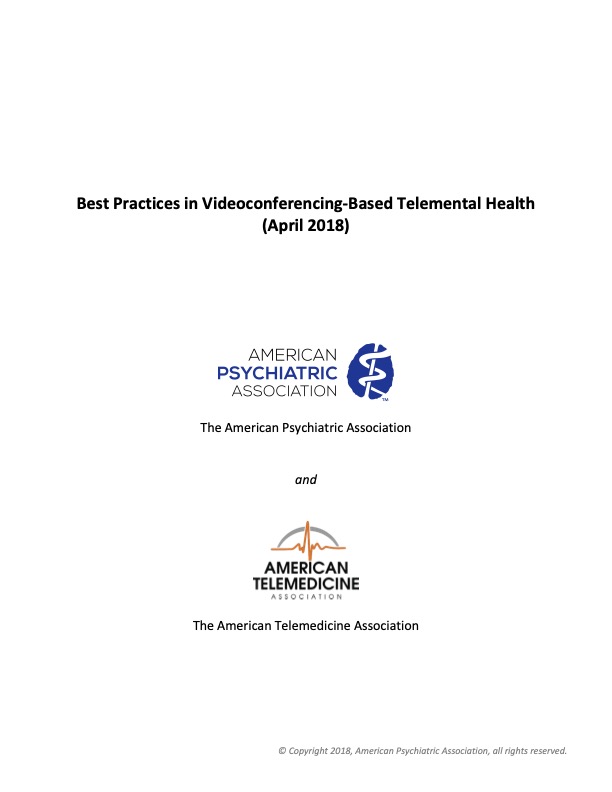
Best Practices in Videoconferencing-Based Telemental Health
This document represents a collaboration between the American Psychiatric Association (APA) and the American Telemedicine Association (ATA) to create a consolidated update of the previous APA and ATA official documents and resources in telemental health to provide a...Dimensions: Tobacco Free Toolkit for Health Care
The toolkit contains a variety of information and resources including a step by step guide about: education about tobacco use skills for engaging people in tobacco cessation discussions efficient methods for assessing readiness to quit information and research on treatmentsCore Competencies Framework for Practice Transformation
The goal of the ICTA program is to improve care and Medicaid beneficiary outcomes within three practice transformation core competencies: Delivering person-centered care across the care continuum Using population health analytics to address complex medical, behavioral health, and social needs; and Engaging leadership to support value-based care. This document provides more detail, including sub-elements for each core competency.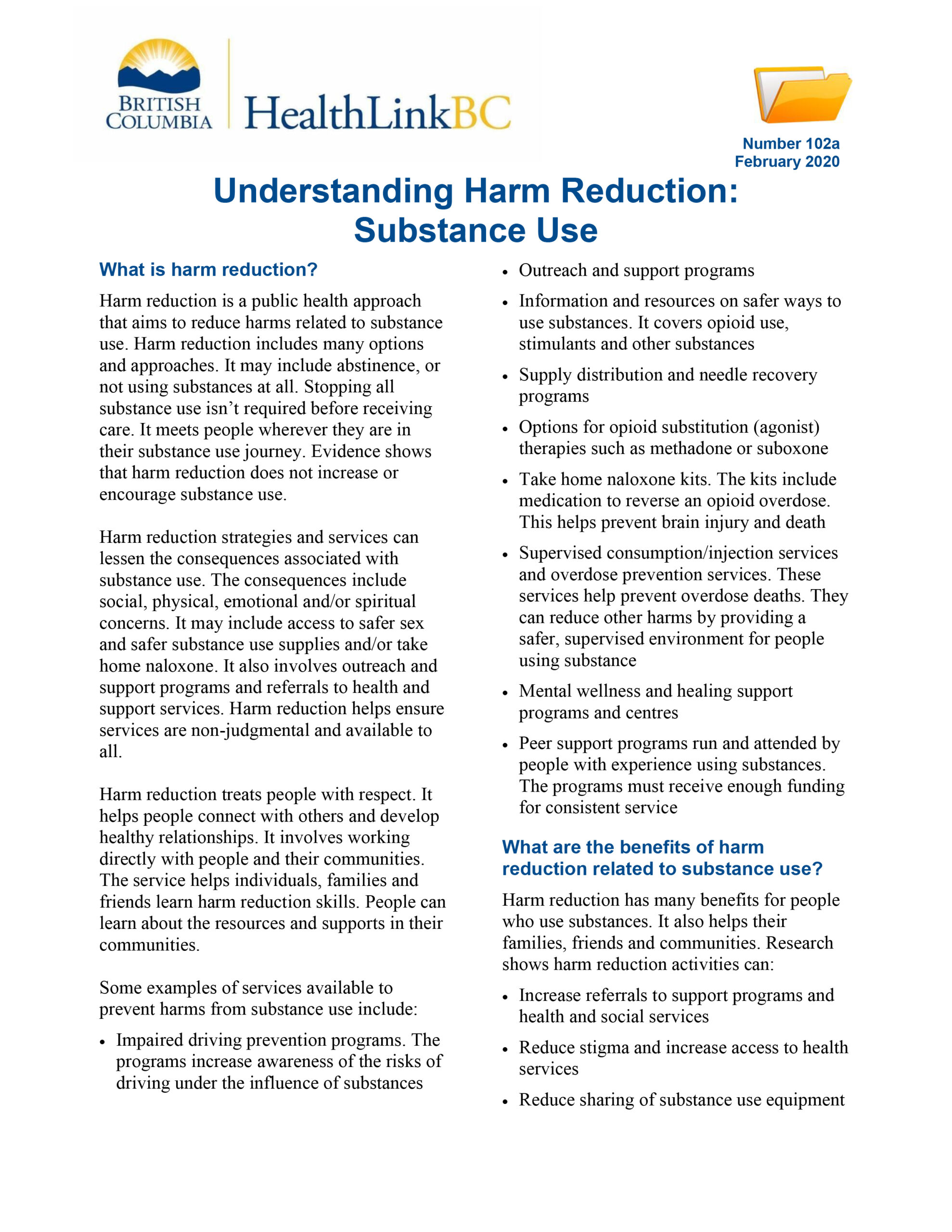
Understanding Harm Reduction: Substance Use
A documented overview of harm reduction, including definitions, benefits related to substance use, and frequently asked questions.Opioid Overdose Prevention ToolKit
This toolkit provides safety advice for patients and family members to help prevent overdose and how to safely use naloxone.The Next Stage of Buprenorphine Care for Opioid Use Disorder
This article reviews research findings in the following 7 areas: location of buprenorphine induction, combining buprenorphine with a benzodiazepine, relapse during buprenorphine treatment, requirements for counseling, uses of drug testing, use of other substances during buprenorphine treatment, and duration of buprenorphine treatment.COVID-19 Public Health Emergency Response & 42 CFR Part 2 Guidance
The Substance Abuse and Mental Health Services Administration provides guidance for substance use disorder treatment services during the COVID-19 pandemic. The document specifies when a medical emergency exists, 42 C.F.R Part 2 does not apply and any disclosure of medical information is temporarily exempt for purposes of medical treatment.FAQs for OUD Prescribing and Dispensing in COVID 19 Emergency
The frequently asked questions document discusses how providers can provide Opioid Treatment to existing and new patients, and dispense medications via Telehealth while still meeting the 42 C.F.R. 8.11 requirements.COVID-19 FAQ for Mental Health Rehabilitation Centers (MHRCs) and Psychiatric Health Facilities (PHFs)
The frequently asked question document makes recommendations on how to care for patients during the COVID-19 pandemic in Mental Health Rehabilitation Centers and Psychiatric Health facilities. The recommendations suggest how to provide Telehealth services, and how to provide medical care for positive COVID-19 patients.COVID-19 FAQ for Behavioral Health
This document is a resource for behavioral health facilities to better understand how to treat patients and refer patients for medical care during the COVID-19 pandemic.Providing Culturally Sensitive, Patient Centered Care
During the webinar, the presenter will focus on ways to address health equity issues and key considerations for providing linguistically effective services. The presenter will discuss best practices and models to support patients in these challenging times.Understanding the Brain and Treatment for People with Opioid Use Disorders
Understanding the brain chemistry associated with opioid use disorder treatment is essential: Medications for Addiction Treatment (MAT) restores depleted dopamine in the brain so people impacted by OUD can regain functioning. Recognizing this, therapy and support services for OUD are most effective when provided in accordance with a person's healing process and readiness to engage in treatment.Stigma, Myth Busters & Engagement Strategies
This webinar will describe how stigma impacts perceptions and resultant SUD care for patients and providers alike. Presenters will also share key concepts and case studies to illustrate ways to address stigma and tools that can be incorporated into their clinical practice.Integrated Physical and Behavioral Healthcare 102
This webinar will focus on the benefits and outcomes of behavioral health integration and key implementation considerations. The presenters will discuss outcomes that include improving population health, patient experience and reduced costs. The webinar will also feature key integration tips such as building internal support, warm handoffs, establishing workflows among other topics.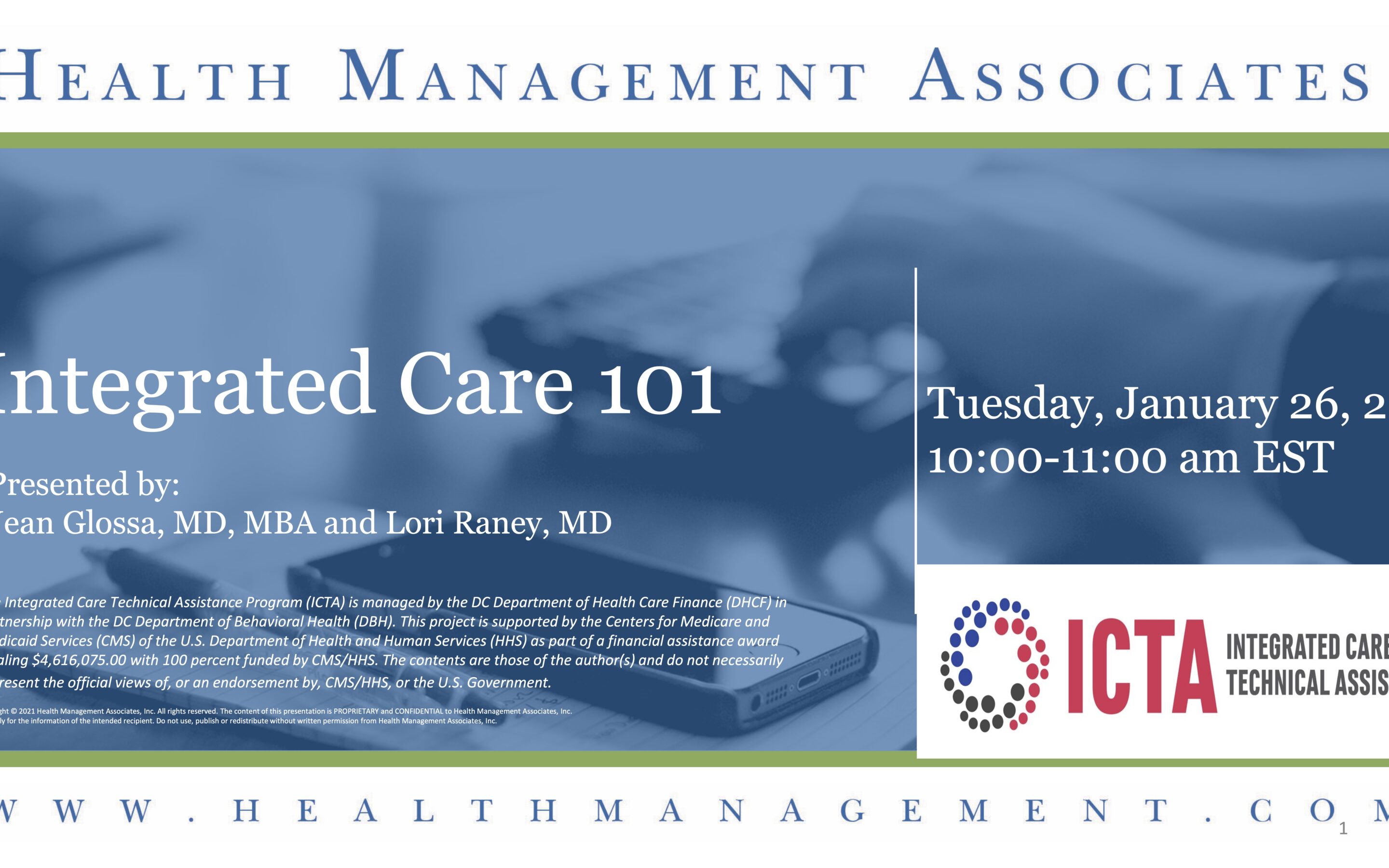
Integrating Physical and Behavioral Healthcare 101
This webinar will focus on the foundational concepts of health care integration – including physical and behavioral health – will be reviewed and discussed. The presenters will also focus on integrating substance use disorders and reverse integration.Addiction Neuroscience 101
This module offers a 25-minute video of the neuroscience of addiction as a chronic brain disease presented by HMA’s Corey Waller, MD, MS, FACEP, DFASAM, with emphasis on Opioid Use Disorder (OUD). "This lecture was developed for audiences of all backgrounds to absorb. From patients to nonspecialist docs. The intent was to move people past the preconceived notion that addiction is a moral failing or choice, to the reality that it is a chronic brain disease that creates maladaptive connections in large swaths of the brain. Over the hundreds of lectures, I have given in my career, I have come to realize that running through 30+ articles in a 70 slide PPT does not move people emotionally. But a good story will. The lecture has coalesced into a story form that is much more compelling than digging through the dense science of voxel dysmorphology, BOLD fMRI technology, and all of the structures postulated to drive craving. If I need a custody officer to "get it" or an administrator to understand the concept, I cannot give them the same lecture I would give a psychiatrist, addiction psychologist, addiction doc, or a neurologist."Provider Information Session
"The systemic approach to providing person-centered care for a defined population that coordinates physical and behavioral healthcare through a team of primary care and behavioral health practitioners, working with the individuals served, families, and other natural and informal supports. Integrated care models ensure that mental health, substance use disorder, primary care, and specialty services are coordinated and delivered in a manner that is most effective to care for individuals with multiple health care needs and produces the best outcomes."How to Screen and Assess People for Substance Use Disorder
This webinar focused on the appropriate screening and assessments for substance use disorders, including the difference between screening and assessment, brief interventions for substance-related issues, and medications for opioid use disorder.
Enlightened Leadership & High Functioning Teams
An interactive exploration of the foundations of leadership and emotional intelligence, the importance of developing trust among team members, and strategies to channel conflict into a productive and necessary force for innovation.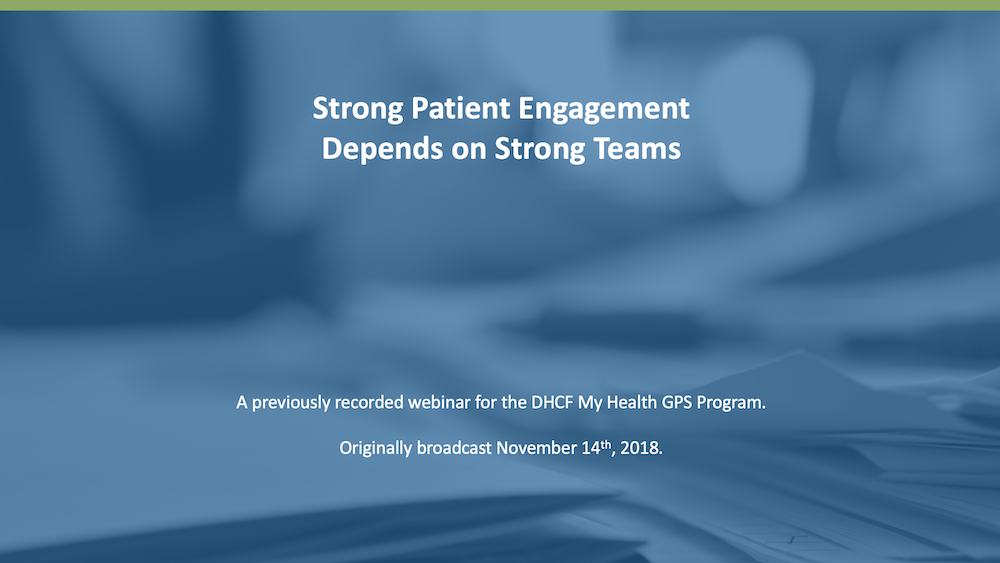
Strong Patient Engagement Depends on Strong Teams
This webinar includes a refresher on motivational Interviewing, presented tools to strengthen patient engagement and strategies for enhancing and maintaining clinician capacity to work with consistency, presence, and joy in the work.